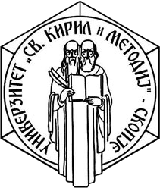[1] MedDATA: Medical Data Analysis, Financed by Scientific and research fund of FINKI, Macedonia, 2021-2022, (project participant)
[2] FoodViz: NLP dataset management platform in the food domain, Financed by Scientific and research fund of FINKI, Macedonia, 2021-2022, (project participant)
[3] National Consultant - Data Scientist for Climate Change MRV platform, financed by UNDP project “Strengthening institutional and technical Macedonian capacities to enhance transparency in the framework of the Paris Agreement” (CBIT PROJECT), 2021-2020
[4] Upgrade the national climate change platform (Develop a knowledge management module, new GHG inventory module and adapt the platform to be accessible for persons with visual and hearing impairment), financed by UNDP CBIT PROJECT, 2021-2020
[5] EUROCC – National Competence Centres in the framework of EuroHPC, Financed by European Union’s Horizon 2020 (H2020), 2020-2022 (project participant)
[6] Data Analytics in Healthcare, Financed by Scientific and research fund of FINKI, Macedonia, 2020-2021, (project participant)
[7] Application of NLP in Food Science, Financed by Scientific and research fund of FINKI, Macedonia, 2020-2021, (project participant)
[8] European Network for Web-Centered Linguistic Data Science, COST Action CA18209, Financed by European COST program, 2019-2023 (Management committee member)
[9] Swedish Institute Innovation Leaders, Financed by Swedish Institute (SI), 2019-2021, (country team member)
[10] NLP in Fintech, Financed by Scientific and research fund of FINKI, Macedonia, 2019-2020, (project participant)
[11] Multilingual NLP Models, Financed by Scientific and research fund of FINKI, Macedonia, 2019-2020, (project participant)
[12] Incubator for Digital Farming, Financed by Visegrad Fund, 2018-2019 (project participant)
[13] Data science-based Global Economy Modelling and forecasting, Financed by Scientific and research fund of FINKI, Macedonia, 2018-2019, (project leader)
[14] Understanding and Modeling Compound Climate and Weather Events (DAMOCLES), COST Action CA17109, Financed by European COST program, 2018-2022 (Management committee member)
[15] Urban Heat Islands Action Plan for City of Skopje, Financed by Regional project: “ICT for urban resilience”, implemented by UNDP and the City of Skopje, 2018 (project leader)
[16] Airborne visual and thermal imagery of Skopje urban area, UNDP Project: “ICT for urban Resilience”, Skopje 2018, (project leader)
[17] Harmonization of UAS techniques for agricultural and natural ecosystems monitoring, COST Action CA16219, Financed by European COST program, 2017-2019 (Management committee member)
[18] Visualization of Inventory of Greenhouse Gas Emissions for the city of Skopje, Financed by UNDP Project: “Increasing Urban Resilience by use for ICT for Mainstreaming Disaster and Climate Risk Reduction in Armenia, Macedonia and Moldova – ICT for urban Resilience”, 2018 (project leader)
[19] LDA: Linked Data Authorization, Financed by Scientific and research fund of FINKI, Macedonia, 2017-2018, (project leader)
[20] From Sharing to Caring: Examining Socio-Technical Aspects of the Collaborative Economy, COST Action CA16121, Financed by European COST program, 2017-2021 (Management committee member)
[21] National Consultant as Data Scientist: Development of data science-based visualization and communication of climate change data for general public and for policy makers. Financed by Project: 00090319 “Macedonian Second Biennial Update Report on Climate Change”, 2017 (consultant)
[22] Climate Change Support Web Platform, Financed by UNDP and Macedonia’s Second Biennial Update Report on Climate Change, 2017, (project leader)
[23] EDISON: Building Data Science Profession, Financed by European Union’s Horizon 2020, 2015-2017, (Expert Liaison Group Member)
[24] SkopjeInfo: Smart Dashboard for the city of Skopje, Financed by City of Skopje Innovation Lab, 2016-2017, (project leader)
[25] MDLData: Multi-domain Linked Data Integration, Financed by Scientific and research fund of FINKI, Macedonia, 2016-2017, (project leader)
[26] Monitoring of the surface waters of the river of Lepenec by using Drones and thermal cameras, Financed by City of Skopje Innovation Lab, 2016-2017, (project leader)
[27] Climate Change Support Web Applications (Mobility Week Calendar App, Event Management Platform and Illustrated Story App), Financed by Macedonia’s Second Biennial Update Report on Climate Change, 2016, (project leader)
[28] Heat Islands in Skopje: Analysis, interpretation, and visualization of the data, Financed by City of Skopje Innovation Lab, 2016, (project leader)
[29] Establishing the Innovation Lab in City of Skopje, Financed by UDNP Development program, 2015-2016 (project participant)
[30] Using semantic web technologies to connect and explore Big Data, Financed by Scientific and research fund of FINKI, Macedonia, 2015-2016, (project leader)
[31] Creating cyber-physical models using analysis of Big Data obtained from Drones and sensors, Financed by Scientific and research fund of FINKI, Macedonia, 2015-2016, (project participant)
[32] e-Services for faculty, Financed by Scientific research fund of ss. "Cyril and Methodius" University- Skopje, Macedonia, 2014-2015, (project leader)
[33] Multi-domain Linked Data Integration, Financed by Scientific and research fund of FINKI, Macedonia, 2014-2015, (project leader)
[34] Linnaeus-Palme cooperation project between FINKI at UKIM and School of Innovation, design and engineering at Mälardalen University, Financed by Swedish Council for Higher Education, 2014-2015 (project coordinator)
[35] Linnaeus-Palme cooperation project between FINKI at UKIM and Department of Computer and Systems Sciences at Stockholm University, Financed by Swedish Council for Higher Education, 2014-2015 (project coordinator)
[36] Mobile application for automatic Attendance time tracking, Faculty of computer science and engineering internal project (project leader), 2014
[37] Diploma thesis management system, Faculty of computer science and engineering internal project (project participant), 2014
[38] My Municipality: The web platform for a survey-based system for interaction with citizens, Financed by United Nations Development Programme in Macedonia, (project participant) 2013-2014
[39] PRV.MK: The web platform and mobile app for latest job openings across the country, including internships, volunteer positions, and entry-level job placements, Financed by United Nations Development Programme in Macedonia, (project participant) 2013-2014
[40] Absence Management Software for FINKI, Faculty of computer science and engineering internal project (project participant), 2013
[41] Semantic Sky 2.0: Enterprise Knowledge Management, Financed by Scientific and research fund of FINKI, Macedonia, 2013-2014, (project leader)
[42] Modelling and Analysis of Dynamical Processes in Composite and Multiplex Networks, Financed by Scientific and research fund of FINKI, Macedonia, 2013-2014, (project participant)
[43] Skopje Green Route, Financed by Financed by United Nations Development Programme Macedonia, and supported by City of Skopje,2013-2014
[44] Student services in the Cloud, Financed by Scientific research fund of ss. "Cyril and Methodius" University- Skopje, Macedonia, 2013-2014, (project leader)
[45] EUROWEB- European Research and educatiOn collaboration with WEstern Balkans, Erasmus Mundus External Cooperation Window, Financed by EU, 2011-2015, (project leader)
[46] Crowdsourcing and mobile technology-based disaster risk reduction software, Financed by United Nations Development Programme, Kosovo Office, 2013, (project leader)
[47] Development of the innovative student services using new technologies, Financed by Scientific research fund of ss. "Cyril and Methodius" University- Skopje, Macedonia, 2012-2013, (project leader)
[48] Using mobile technologies for disaster risk reduction, Financed by United Nations Development Programme Project: 00078215 Disaster and Climate Risk Reduction, 2012, (project leader)
[49] Enterprise Linked Data, Financed by Scientific and research fund of FINKI, Macedonia, 2012-2013, (project leader)
[50] Mobile student services, Financed by Scientific research fund of ss. "Cyril and Methodius" University- Skopje, Macedonia, 2011-2012, (project leader)
[51] Leveraging Open Data with Cloud-based Semantic Actions, Financed by Scientific and research fund of FINKI, Macedonia, 2011-2012, (project leader)
[52] Comparative Analysis of the ICT Projects of the Ministry of Information Society and Administration of the Republic of Macedonia and Government ICT Projects in Estonia and Slovenia, Financed by Scientific and research fund of FINKI, Macedonia, 2011-2012, (project participant)
[53] Establishment of the National HPC initiative and HPC center, Financed by Scientific and research fund of FINKI, Macedonia, 2011-2012, (project participant)
[54] Creativity support tools development using internet services, Applicative research project grant. Ministry of education and science of R. Macedonia, 2011 (team leader)
[55] Application of advanced telemetric techniques in monitoring and control of ambient conditions (temperature, moisture and light) for increasing the productivity in the eggs production, Applicative research project grant. Ministry of education and science of R. Macedonia, 2011 (team member)
[56] Programming framework for Semantic web application development, Financed by Scientific and research fund of FEIT, 2010-2011, (project leader)
[57] System on Chip Design, financed by: Tempus JEP-41107-2006, start date: 2007, end date: 2010, (project leader)
[58] Diagnosing vulnerability, emergent phenomena and volatility in man-made networks, financed by: FP6 STREP EU, 2007-2010 (participant)
[59] Software for electronic submission of monthly pension, social and employment contribution and personal income tax. financed by: Pension and Disability Fond of Macedonia (PIOM) start date: 2008, end date: 2008, (project leader)
[60] Feasibility study for information and communication system for Integrated Border Management, financed by: Government of RM, 2008
[61] Design and implementation of wireless sensor network for temperature and humidity measurement, Replek – Skopje, 2008, (project leader)
[62] FEITle: Learning support web application, supported by: Faculty of Electrical Engineering and Information Technologies, start date:2006 end date 2009
[63] Software for electronic submission of monthly pension payments, financed by: World Bank and Pension and Disability Fond of Macedonia (PIOM), start date: 2005, end date: 2006, (project leader)
[64] Distance learning for electrical specialist, financed by: Ministry of science of R. Macedonia, start date: 2003, end date: 2004
[65] Test-bed implementation and transfer of knowledge for e-applications development, financed by: GTZ TT, start date: 2003, end date: 2004, (project leader)
[66] Software development for Unnamed aerial vehicle (UAV), financed by: Ministry of Defense of R. Macedonia, start date: 2001, end date: 2002
[67] Application for detection of chip cards frauds for Publics Phone Center of Macedonian Telecommunications, financed by: Macedonian Telecommunications, start date: 2001, end date: 2001, (project leader)
[68] Real-time Network platforms for mission critical embedded systems, financed by: Ministry of science of R. Macedonia, start date: 2000, end date: 2001
[69] ERP system for the JAKA80, financed by: Jaka 80, Radovis, Macedonia, start date: 2000, end date: 2000
[70] Program for General Ledger, Financials, Materials, financed by: Medicinska Plastika - TETOVO, Macedonia, start date: 2000, end date: 2000
[71] Project for introducing of new Information system in Copper Mine “Bucim” a.d. Radovis, financed by: Copper Mine “Bucim” a.d. Radovis, Macedonia, start date: 2000, end date: 2000, (project leader)
[72] Computer network design for Copper Mine “Bucim” a.d. Radovis, financed by: Copper Mine “Bucim” a.d. Radovis, Macedonia, start date: 2000, end date: 2000 (project leader)
[73] KESH Project- F+A Integrated Information System, financed by: Albania Electric Power Company and WB, start date: 1999, end date: 2000
[74] Water Management and Sustainable Management Based on Ground Stations and Satellite Images, financed by: INCO-COPERNICUS European Commission DG XII , start date: 1998, end date: 2000




